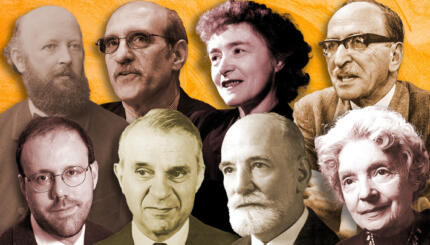Lodz was the last remaining ghetto in Poland when it was destroyed in the spring of 1944. This was no accident: the ghetto was an industrial powerhouse for the Nazis, containing, at its height, nearly 100 factories dealing in textiles and manufactured goods — all made by the hands of forced Jewish labor.
Mordechai Chaim Rumkowski, the chairman of the Lodz ghetto’s Jewish council, or Judenrat, was largely responsible for this productivity. A quixotic opportunist, Rumkowski made a morally dubious call: to work with the Nazis to make the ghetto as productive as possible, prove the ghetto’s indispensability, and perhaps thereby lessen the severity of the Jews’ inevitable fate.
Rumkowski is a fascinating figure and proves equally fascinating in the fictional guise of I.C. Trumpelman, the protagonist of Leslie Epstein’s polarizing 1979 debut King of the Jews.
Like his real-life inspiration, Trumpelman is an unknowable, often merciless character who willingly facilitates the deportation of Jewish children to the camps only to broker improvements for those who remain. He believes that sacrificing Jews in order to save Jews is a worthy calculus. We can’t tell if he’s a martyr or a murderous lunatic. He is probably both.
With your help, My Jewish Learning can provide endless opportunities for learning, connection and discovery.
Told more like a fable than a realist narrative, Epstein’s novel replaces Germans and Nazis with “the occupying power” and “warriors.” There’s none of the runaway horror here that’s present in other Holocaust novels. Epstein relies on humor and farce, and on taking everyone down a peg. The Nazis weren’t atypical, the book suggests — they were ordinary people doing extraordinary things.
The Jews, likewise, weren’t atypical either. They were regular people who were also capable of committing regular sins. King of the Jews wasn’t the first book to make this case, but it’s certainly among the best to do so.
Not everyone agreed. Ruth Wisse, writing in Commentary, decried the book for its “flat caricatures, cabaret style of narration, and stylized theatrical staging.” All of which are what make the novel thrive. This book tale is so unlike other Holocaust novels that it demands to be taken seriously.
Epstein believed that a book can be both serious and funny. In a 1999 interview with The Atlantic, he explained that King of the Jews was “attacked for its tone and for its not being a sacred treatment of the Holocaust.”
To that, he said: “I think my critics are nuts.”
Ready to meet Trumpelman? Grab your copy of King of the Jews here.
Explore more with an excerpt from the book.



